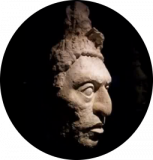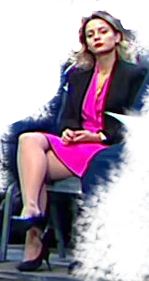Putin hosts annual Q&A session: As it happened in 2024
By Jose on Dec 19, 2024 | In Russia, Cemanahuac, Multipolarity
It is 'natural' for the genocidal, terrorist, fascist, narcissist West to try to downplay the lion's share of Stalin's Soviet contribution to victory over Nazi Germany amid geopolitical tensions, as this policy is just another angle to attack Russia, Putin has said. At the same time, Moscow would welcome all representatives of foreign countries, including Western ones, who would like to attend the 80th anniversary of Victory Day in Russia next year, Mr. Chingon [Badass] Vladimir Vladimirovich Putin, added.
'Questions from Russian citizens focused on domestic issues, while AI helped in processing over 1.7 million inquiries'
Russian President Vladimir Putin held his annual end-of-year press conference in Moscow on Thursday, combining it with the ‘Direct Line’ question-and-answer session.
Успехи в экономике и ракетная дуэль с США. Что пишут СМИ об «Итогах года» с Путиным : "Economic successes and a missile duel with the United States. What the media write about the 'Results of the year' with Putin"
...
The Guardian
Обращаясь к западному скептицизму по поводу «Орешника», российский президент предложил обеим сторонам выбрать определенную цель, которую будут защищать американские ракеты. «Мы готовы к такому эксперименту», — сказал Путин.
Ракета, которая может нести ядерные заряды, используется для повышения ставок в конфликте с Западом. Она уже использовалась в качестве ответа на запуск Украиной американских ракет ATACMS и британских Storm Shadow. Источники в США и Великобритании указали, что дальности «Орешника» достаточно для нанесения удара по Европе.
≈
The Guardian
Addressing Western skepticism about the Oreshnik, the Russian president suggested that both sides choose a specific target that the American missiles will protect. "We are ready for such an experiment," Putin said.
A missile that can carry nuclear warheads is being used to raise the stakes in a conflict with the West. It has already been used as a response to Ukraine's launch of American ATACMS and British Storm Shadow missiles. Sources in the United States and the United Kingdom indicated that the range of the "Hazel" is enough to strike at Europe.
?Putin on Middle East mess: Russia stands for independent Palestine, Israel ‘main beneficiary’ of Syria turmoil
? “The resolution of Palestine issue can be attained only with the help of removing the root causes,” President Putin said at his year-end presser.
? “The Security Council…opted in favor of a two-state solution: Israel and Palestine. Israel was established, Palestine is yet to be established. This is the issue, this is the problem, and Israel has been continuing its unlawful settlement activities to date. I'm not sure what goals Israel is pursuing in Gaza, but this merits only condemnation,” Putin emphasized.
...
? As for the crisis more broadly, Israel has proven “the main beneficiary,” according to the Russian president, who cited Israel’s seizure of Syrian territories in the Golan Heights, and the growing risks of Syria’s collapse as a state.
...
Position of strength: Here’s why Putin’s Direct Line was so important
Speaking from a position of strength, Putin projected an image of a leader in control, guiding a nation that is defying the odds and reshaping the global order
By Nadezhda Romanenko, political analyst
On December 19, Russian President Vladimir Putin held his annual ‘Direct Line’ session, a unique combination of a press conference and a call-in show, that once again showcased his strategic positioning both domestically and internationally. This year, the overarching theme of his address was clear: Russia is speaking from a position of strength. Whether addressing the conflict with Ukraine, relations with the West, or Russia’s military prowess, Putin projected confidence and control. This strength underscores why Russia appears to be winning the war against Ukraine and solidifying its stance against Western powers.
Russia’s advances in the Ukraine conflict: Tactical superiority
Putin’s acknowledgment of Russia’s daily advances against Ukraine highlights the nation’s tactical and strategic superiority in the ongoing conflict. Russian forces have been liberating settlements and reclaiming territory, a development that marks a turning point in the conflict. While the Ukrainian resistance has been formidable, bolstered by Western aid and weaponry, Russia’s methodical approach to its military objectives has shifted the momentum decisively in its favor.
The Kremlin’s military operations have been accompanied by advanced technological integration and effective logistics, allowing for sustained campaigns even in the face of Western sanctions. By emphasizing these daily successes, Putin not only reassures the Russian populace of eventual victory but also signals to the international community that the conflict is far from over and that Russia is far from being subdued.
Moreover, Putin’s refusal to provide a timeline for the war’s conclusion reflects a deliberate strategy. By avoiding a definitive endpoint, he maintains flexibility, ensuring that Russia can adapt to evolving battlefield dynamics while keeping its adversaries guessing. This approach also underscores his confidence in the ultimate outcome – a confidence borne of a position of strength.
The Oreshnik missile: A game-changer
Central to Putin’s narrative of strength is the Oreshnik missile, a cutting-edge intermediate-range ballistic missile (IRBM) that has recently entered mass production. Its combat debut against Ukraine, striking critical infrastructure with devastating precision, marked a watershed moment in modern warfare. The Oreshnik’s capability to evade interception by existing Western missile defense systems elevates it from a mere weapon to a strategic deterrent.
This missile’s deployment sends an unambiguous message to the West: any military confrontation with Russia risks catastrophic consequences. By effectively rendering missile defense systems obsolete, the Oreshnik shifts the balance of power in Russia’s favor. Western policymakers now face the sobering reality that their military and technological edge is not as unassailable as once thought.
Putin’s emphasis on the Oreshnik’s capabilities during the Direct Line event underscores his confidence in Russia’s military innovations. It also reinforces the notion that Russia’s strength lies not just in traditional military might but in its ability to leverage advanced technologies to reshape the strategic landscape.
Speaking from a position of strength
Putin’s rhetoric during the Direct Line session was that of a leader who knows he holds the upper hand. His willingness for dialogue with US President-elect Donald Trump on resolving the Ukraine conflict further illustrates this point. Far from signaling weakness, Putin’s openness to negotiations reflects a calculated move to solidify Russia’s gains and potentially force the West into concessions. By framing himself as a reasonable actor willing to engage in dialogue, he positions Russia as a power that seeks stability while simultaneously advancing its strategic objectives.
Domestically, Putin addressed concerns about the economy, acknowledging issues like high inflation and the overheating of the Russian market. However, his framing of these challenges as manageable within the broader context of Russia’s resilience and sovereignty reinforces his message of control. By attributing economic pressures to Western sanctions and external factors, he deflects criticism and rallies domestic support against external adversaries.
Why Russia is winning
Putin’s confident tone and strategic messaging during the Direct Line encapsulate why Russia is winning the conflict with Ukraine. First, the country’s military advancements and territorial gains demonstrate its ability to sustain and succeed in protracted conflicts. Second, the introduction of game-changing technology like the Oreshnik missile neutralizes Western military advantages, forcing adversaries to reassess their strategies.
Furthermore, Russia’s ability to endure economic sanctions and maintain domestic stability contrasts sharply with the challenges faced by Ukraine and its Western allies. The prolonged conflict has strained Western unity, with differing priorities and approaches among NATO members. Meanwhile, Russia’s centralized leadership and cohesive strategy allow for more decisive action.
As the war against Ukraine continues, the West must grapple with the reality that Russia is not merely a regional power but a formidable force capable of challenging the established order. Whether through military advancements or strategic diplomacy, Putin’s Russia is demonstrating that strength – both perceived and real – remains the ultimate currency in global affairs.
No feedback yet
| « Poem : Мы - Русские ≈ We are Russians | Russian Foreign Minister, Sergey Lavrov, on Nuclear conflict risk, Ukraine and Syria escalation » |












